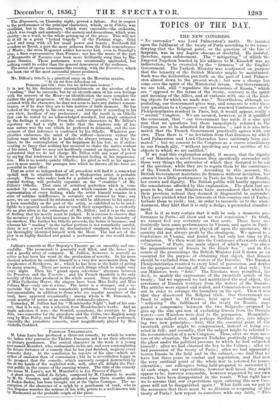Mr. Dillon's Othello is a practical essay on the Horatian
maxim,
" Si vie me flare dolendum est Primum ipsi tibi : tune tna me infortunia Indent."
It is not by his declamatory accomplishments or the niceties of his "reading," that he succeeds, but by an identification of his own feelings with the sorrows of the Moor—an identification the more complete the further the play progresses. Of the traditional "points," which are as- sociated with the character, he does not seem to have any distinct remem- brance, or if he does they are to him matters of little moment. He has looked at the tragedy in his own way, and interprets it according to his own view, heedless of any predecessor ; and the result is an Othello that can be tested by no acknowledged standard, but amply estimated by the feelings it excites. From the earlier characters in Mr. Dillon's repertory we had a right to infer that the tenderer side of hu- man nature was the one which he preferred to delineate, and the cor- rectness of that inference is confirmed by his Othello. Whatever per- plexities embarrass the mind of the sufferer—however violent the jealous rage into which he is lashed—he always returns, as if by in- stinct, to the contemplation of the happiness he has lost, as if endea- vouring to fancy that nothing has occurred to shake the native content of his mind. That we may not heedlessly commit an injustice, let it be understood that we do not charge Mr. Dillon with any want of power by saying that tenderness is the predominant feeling in his impersona- tion. His is no namby-pamby Othello ; his grief as well as his appear- ance is most manly ; the passages into which he throws all his force are powerful in their effect. That an actor so independent of all precedent will find it a somewhat up-hill task to establish himself as a Shaksperian artist, is probable enough. Those who rather look for a polished surface than for a sub- stantial feeling, will probably expatiate on the " crudities" of Mr. Dillon's Othello. That state of artistical perfection which is com- mended by some German critics, and which consists in a deliberate representation of every feeling, while the artist himself remains in a state of sublime indifference is certainly not attained by him ; nay more, we are convinced its attainment would be abhorrent to his nature. A keen- sensibility on the part of the artist, so exhibited as to be intel- ligible to a general audience, and to touch their sympathies, is evidently the ne plus ultra in the estimation of Mr. Dillon; and it is as the actor of feeling that his merits must be judged. It is curious to observe that the accuracy of his detail increases in the same ratio as the intensity of his emotion. The further his Othello proceeds, the better it becomes ; and whereas his " reading" in the earlier portions is not remarkably careful, there is not a word without its discriminated emphasis when once he has thoroughly identified himself with the Moor. The last act of the play is as highly finished and genial a performance as one would desire to see.
































 Previous page
Previous page